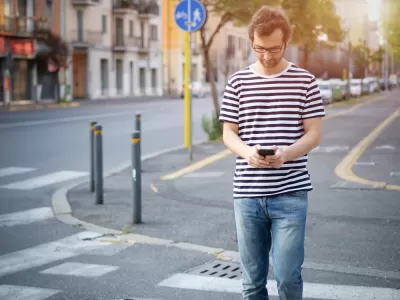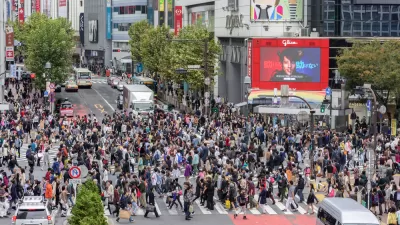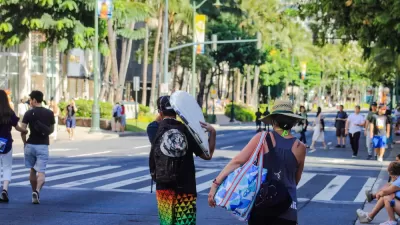Crossing the street can be dangerous in the best conditions, but a $500 fine for looking at the phone while crossing the street won't help anything, according to this editorial.

The Chicago Tribune Editorial Board has seen a few aldermen in the city of Chicago follow the lead of Honolulu (which implemented fines for crossing the street while looking at a mobile phone over the summer). Specifically, "Ald. Edward Burke, 14th, and Anthony Beale, 9th, propose to slap fines of up to $500 on pedestrians caught texting or using a cellphone while walking through an intersection."
According to the editorial, such a law "looks virtually uneforcable." More over, the $500 fine "belongs with other well-intentioned but goofy aldermanic notions, including the famous attempt to put diapers on carriage horses."
Chicago is not the only city to pile on the distracted walking bandwagon—politicians in Cleveland and Stamford, Connecticut have also mulled the idea of prohibiting distracted walking.
The Onion, at least, is more in line with the Chicago Tribune's Editorial Board, as made clear by one of their "American Voices" posts.
FULL STORY: Listen up, fellow cellphone zombies

Study: Maui’s Plan to Convert Vacation Rentals to Long-Term Housing Could Cause Nearly $1 Billion Economic Loss
The plan would reduce visitor accommodation by 25,% resulting in 1,900 jobs lost.

North Texas Transit Leaders Tout Benefits of TOD for Growing Region
At a summit focused on transit-oriented development, policymakers discussed how North Texas’ expanded light rail system can serve as a tool for economic growth.

Using Old Oil and Gas Wells for Green Energy Storage
Penn State researchers have found that repurposing abandoned oil and gas wells for geothermal-assisted compressed-air energy storage can boost efficiency, reduce environmental risks, and support clean energy and job transitions.

Private Donations Propel Early Restoration of Palisades Playground
Los Angeles has secured over $1.3 million in private funding to restore the Pacific Palisades playground months ahead of schedule, creating a modern, accessible space that supports community healing after recent wildfires.

From Blight to Benefit: Early Results From California’s Equitable Cleanup Program
The Equitable Community Revitalization Grant (ECRG) program is reshaping brownfield redevelopment by prioritizing projects in low-income and environmental justice communities, emphasizing equity, transparency, and community benefits.

Planting Relief: Tackling Las Vegas Heat One Tree at a Time
Nevada Plants, a Las Vegas-based nonprofit, is combating the city’s extreme urban heat by giving away trees to residents in underserved neighborhoods, promoting shade, sustainability, and community health.
Urban Design for Planners 1: Software Tools
This six-course series explores essential urban design concepts using open source software and equips planners with the tools they need to participate fully in the urban design process.
Planning for Universal Design
Learn the tools for implementing Universal Design in planning regulations.
Ascent Environmental
Borough of Carlisle
Institute for Housing and Urban Development Studies (IHS)
City of Grandview
Harvard GSD Executive Education
Toledo-Lucas County Plan Commissions
Salt Lake City
NYU Wagner Graduate School of Public Service





























